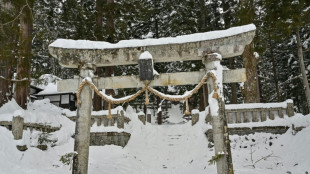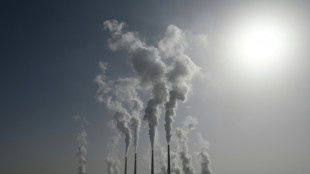
-
 Critically-ill pope had a good night, Vatican says
Critically-ill pope had a good night, Vatican says
-
Asian markets track Wall St loss; Frankfurt lifted by German vote

-
 Paedophile French surgeon on trial for abusing almost 300 patients
Paedophile French surgeon on trial for abusing almost 300 patients
-
Zelensky hails Ukraine's 'heroism' on third anniversary of Russia's invasion

-
 In Ukraine, anticipating the 'next' war with Russia
In Ukraine, anticipating the 'next' war with Russia
-
Macron to present Trump with 'proposals' on peace in Ukraine

-
 Zelensky hails Ukraine's 'heroism' on third annniversary of Russia's invasion
Zelensky hails Ukraine's 'heroism' on third annniversary of Russia's invasion
-
Cavs hold off Grizzlies for seventh straight NBA win

-
 China's Alibaba to invest $50 bn in AI, cloud computing
China's Alibaba to invest $50 bn in AI, cloud computing
-
Vatican thriller 'Conclave' wins top prize in SAG Awards upset

-
 Dominant Ducati unleash deposed MotoGP kings Marquez and Bagnaia
Dominant Ducati unleash deposed MotoGP kings Marquez and Bagnaia
-
Premier League champions-elect Liverpool leave mark on Man City

-
 Indonesia launches new multi-billion-dollar sovereign wealth fund
Indonesia launches new multi-billion-dollar sovereign wealth fund
-
South Korean fans soak up nostalgia with vintage Japanese superheroes

-
 Most Asian markets track Wall St loss; Hong Kong extends gains
Most Asian markets track Wall St loss; Hong Kong extends gains
-
German vote winner Merz faces tough talks to build govt

-
 Japan warns of avalanches, icy roads ahead of more snow
Japan warns of avalanches, icy roads ahead of more snow
-
All Black Caleb Clarke admits dangerous driving: NZ media

-
 Debutants San Diego stun Galaxy with win in Los Angeles
Debutants San Diego stun Galaxy with win in Los Angeles
-
India's Modi uses mega Hindu festival to burnish credentials

-
 Surprise rebel alliance could give Sudan's beleaguered RSF a boost
Surprise rebel alliance could give Sudan's beleaguered RSF a boost
-
Three years after Russia invasion, UN faces difficult votes on Ukraine

-
 German 'rust belt' town spotlights growing appeal of the far right
German 'rust belt' town spotlights growing appeal of the far right
-
Campbell downs Potgieter in playoff for first PGA Tour title in Mexico

-
 USA and Japan win to set up SheBelieves Cup decider
USA and Japan win to set up SheBelieves Cup decider
-
Most USAID workers to be fired or placed on leave

-
 Battery X Metals Highlights 2024 Achievements and Shares Vision for 2025
Battery X Metals Highlights 2024 Achievements and Shares Vision for 2025
-
Argo Blockchain PLC Announces Hosting Update

-
 Hemogenyx Pharmaceuticals PLC Announces First-in-Human Treatment with HG-CT-1
Hemogenyx Pharmaceuticals PLC Announces First-in-Human Treatment with HG-CT-1
-
Hakimi scores twice as PSG sink Lyon to stay unbeaten in Ligue 1

-
 Hat trick pulls Ovechkin closer to Gretzky's NHL goals record
Hat trick pulls Ovechkin closer to Gretzky's NHL goals record
-
Tanaka strikes again as Japan down Colombia

-
 Baker wins US indoor 60m as Kessler, Hiltz complete double
Baker wins US indoor 60m as Kessler, Hiltz complete double
-
Kane admits last-minute decision to make Bayern bench

-
 Bakers wins US indoor 60m as Kessler, Hiltz complete double
Bakers wins US indoor 60m as Kessler, Hiltz complete double
-
American Airlines flight lands in Rome after 'security' issue

-
 Dupont eyeing Six Nations showdown with Ireland after Italy rout
Dupont eyeing Six Nations showdown with Ireland after Italy rout
-
Slot wary of Premier League dangers despite 'big' Man City win

-
 Borthwick defiant after uninspired England edge Scotland
Borthwick defiant after uninspired England edge Scotland
-
Nations at odds over major UN climate science report

-
 Pakistan fans look away from India Champions Trophy 'humiliation'
Pakistan fans look away from India Champions Trophy 'humiliation'
-
Global prayers as Vatican says pope still 'critical'

-
 Pakistan's Rizwan admits Champions Trophy dream 'ended' by India
Pakistan's Rizwan admits Champions Trophy dream 'ended' by India
-
France star Dupont eyeing Six Nations showdown with Ireland after Italy destruction

-
 'We need another title', says Salah after 'special' Man City win
'We need another title', says Salah after 'special' Man City win
-
Relentless Bayern stay eight points clear

-
 Kohli shuts down 'noise' with landmark century
Kohli shuts down 'noise' with landmark century
-
Modric stunner maintains Real Madrid title charge

-
 Salah-inspired Liverpool beat Man City to open up 11-point Premier League lead
Salah-inspired Liverpool beat Man City to open up 11-point Premier League lead
-
Townsend wants England agony to inspire Scotland for Six Nations finish


Skiing into the unknown: Beijing's man-made Olympic pistes
When the alpine skiers take to the piste at the Beijing Olympics this week, they will do so on artificial snow in an often drought-ridden region.
To the outsider, the idea of hosting ski events in Yanqing, in a largely uninhabited area north of the Chinese capital that is often parched, might seem alien.
The National Alpine Skiing Centre has been man-made, tucked away up an anonymous valley.
Streaks of white are etched into a barren-looking series of steep rocky hills -- sparsely forested and in places covered by huge sheets of wire netting.
The hills were once part of the Songshan National Nature Reserve.
Thousands of gallons of water have been used to create the snow on the course. There is no outlying snow to speak of.
The venue is linked to downtown Yanqing district by a brand-new motorway that shoots through a series of long tunnels and culminates in a raised jumble of roads.
A string of red bubble-cars quickly transports skiers up to the slopes past the sliding centre on the left that will be used for luge, skeleton and bobsleigh events, while the Olympic Village for the mountain competitors is on the right.
Soldiers man the mid-station of the lift, decked out in green greatcoats and oversized caps.
A road used for bus transport for the final ascent winds circuituously below the bubble-cars, marked with the venue's logo and sporting Olympic stickers.
Passengers enjoy the luxury of heated seats -- and warmed salopettes are welcome with temperatures falling to minus 15 degrees Celsius (five degrees Fahrenheit) and made even colder higher up the course with the significant chill from a strong wind that constantly snaps the national flags.
The approach to the two pistes that will be used for the speed events -- the downhill and super-G -- and technical events (slalom and giant slalom) is nothing short of startling.
As hard as it is to believe for the onlooking layman, the concept of constructing pistes and using artificial snow is nothing new.
Four years ago, skiing at the Pyeongchang Olympics was held in a location with a strikingly similar topographical feel to that of Yanqing.
There too, an army of workers were brought in to construct not only the course layouts but also, importantly, manufacture the artificial snow employed for racing.
Racers in China, however, have not had the opportunity to try out the new pistes after World Cup races scheduled in 2020 and 2021 were cancelled because of Covid-19 restrictions.
From the little feedback there has been, the course is deemed steep, with a maximum gradient of 68 percent, and is sure to be testing given its icy surface on terrain that pitches and rolls and features four of five jumps.
"This might be one of the best racing mountains in the world," boasted Bernhard Russi, the "piste architect" who has been creating courses for the International Ski Federation since 1980, having won gold and silver for Switzerland in the Olympic downhills in 1972 and 1976.
"It's going to be a very challenging course."
Fabien Munier, coach of French medal hope Alexis Pinturault, said the course was also "undulating".
"We received a few videos this summer, there are some Chinese who train and exchanged details with the Austrians, but there's really very little information," he said.
"Snow conditions should be very cold and that changes a lot of things in relation to kit set-up, skis and boots. The snow will be aggressive, grippy."
Italian veteran Christof Innerhofer said on a scale from one to 10, "I would say that the difficulty of the downhill is seven".
"You can see that it is a track designed by Bernhard Russi," Innerhofer told Gazzetta dello Sport newspaper.
"There are no jumps, but several bumps and a traverse in the upper part, as in South Korea, even if overall it seems a bit more difficult to me."
Alberto Ghidoni, head of the Italian speed team, said the slopes were not for the faint-hearted, "not easy, very steep", and even went as far as questioning their future use.
"They're not for tourists in my opinion, even if here they would like to teach people to ski."
X.Karnes--AMWN